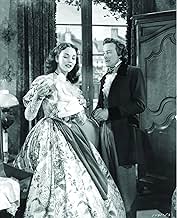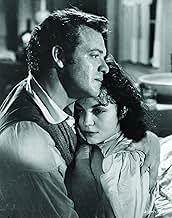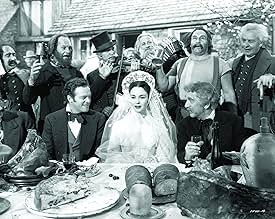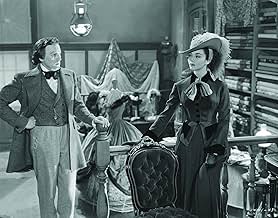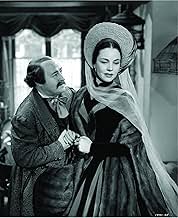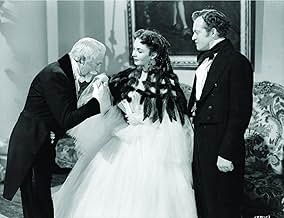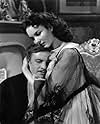IMDb RATING
7.0/10
3.1K
YOUR RATING
A provincial doctor's wife's romantic illusions about life and social status lead her to betray her naive husband, take on lovers, and run up ruinous debts.A provincial doctor's wife's romantic illusions about life and social status lead her to betray her naive husband, take on lovers, and run up ruinous debts.A provincial doctor's wife's romantic illusions about life and social status lead her to betray her naive husband, take on lovers, and run up ruinous debts.
- Director
- Writers
- Stars
- Nominated for 1 Oscar
- 2 wins & 1 nomination total
Alf Kjellin
- Leon Dupuis
- (as Christopher Kent)
Harry Morgan
- Hyppolite
- (as Henry Morgan)
- Director
- Writers
- All cast & crew
- Production, box office & more at IMDbPro
Featured reviews
Though I'm sure that the various French dramatizations of Madame Bovary are probably superior to this film, this English language version that MGM did in 1949 is as good as any we would have gotten from Hollywood. of that era. Jennifer Jones, Van Heflin, Louis Jourdan, and James Mason were unfortunately hampered by the Code in this version.
MGM's version incorporates the author right into his story. James Mason plays Gustave Flaubert and the film opens with him on trial for authoring indecent material as the French censors of the day saw Madame Bovary. While on the witness stand defending his work, he tells the story of his creation Emma Bovary, a girl with silly romantic notions who brings tragedy all around because of them.
Jennifer Jones is Emma and imagine Bernadette Soubirous who instead of having a divine experience has the misfortune to have other things peak her interest as an adolescent. She reads a whole lot of romantic novels who give her exaggerated notions about the nature of love.
She lives in a pretty dull town in Normandy which was also where Flaubert himself hailed from and which he satirizes in acid in this work. She marries solid, dependable Van Heflin who's a doctor and who she hopes will give her a better life.
It's in Heflin's character that the Code watered down what Flaubert was trying to say. Here he's an upright guy, a lot on the dull side, but dependable. In the novel he's as much desiring of social climbing as Jones is. In fact in the film he refuses to perform an operation that might gain him fame and success because he knows he's not qualified to do it. In the novel he does the operation and it ends in disaster all around.
Jones takes lovers Louis Jourdan and Alf Kjellin and runs up bills that put Heflin into financial disaster. All the while refusing to face the truth about life and herself.
Given the Code restrictions director Vincente Minnelli does as best as he can with his cast. James Mason makes a brilliant and erudite Flaubert on the stand. But considering he was on trial for indecency by not showing the alleged indecency to the fullest the Code defeated what could have been a classic.
MGM's version incorporates the author right into his story. James Mason plays Gustave Flaubert and the film opens with him on trial for authoring indecent material as the French censors of the day saw Madame Bovary. While on the witness stand defending his work, he tells the story of his creation Emma Bovary, a girl with silly romantic notions who brings tragedy all around because of them.
Jennifer Jones is Emma and imagine Bernadette Soubirous who instead of having a divine experience has the misfortune to have other things peak her interest as an adolescent. She reads a whole lot of romantic novels who give her exaggerated notions about the nature of love.
She lives in a pretty dull town in Normandy which was also where Flaubert himself hailed from and which he satirizes in acid in this work. She marries solid, dependable Van Heflin who's a doctor and who she hopes will give her a better life.
It's in Heflin's character that the Code watered down what Flaubert was trying to say. Here he's an upright guy, a lot on the dull side, but dependable. In the novel he's as much desiring of social climbing as Jones is. In fact in the film he refuses to perform an operation that might gain him fame and success because he knows he's not qualified to do it. In the novel he does the operation and it ends in disaster all around.
Jones takes lovers Louis Jourdan and Alf Kjellin and runs up bills that put Heflin into financial disaster. All the while refusing to face the truth about life and herself.
Given the Code restrictions director Vincente Minnelli does as best as he can with his cast. James Mason makes a brilliant and erudite Flaubert on the stand. But considering he was on trial for indecency by not showing the alleged indecency to the fullest the Code defeated what could have been a classic.
Jennifer Jones is "Madame Bovary" in this 1949 adaptation of Flaubert's novel, directed by Vincente Minnelli and also starring Van Heflin, James Mason, Louis Jourdan, Gene Lockhart, Alf Kjellin and Ellen Corby. The film starts with Flaubert, on trial for indecency. As he defends the book, he tells the story of Emma Bovary, a delusional young woman living on a farm who, from romantic novels, has unrealistic ideas about love and happiness. She nabs a simple country doctor (Van Heflin) and proceeds to buy herself an incredible wardrobe and live as a rich woman, even though she and her husband are not wealthy. She has a little girl whom she ignores, leaving her to the nurse (Corby). Emma soon becomes bored and attempts to seduce a young man (Kjellin), but his mother (Gladys Cooper) catches on and sends him to Paris. Then she meets Boulanger (Jourdan) at a party, becomes his lover and plans to run away with him to Italy - but he sees what high maintenance she is and takes off without her. In an attempt to make her husband more prominent, she attempts to talk him into performing a new surgery, but he refuses (in the book, however, he's ambitious as well and does the surgery, which is a failure). Meanwhile, unbeknownst to her husband, she owes a fortune, and if she doesn't find a way out, the family is due to lose their home and furnishings.
"Madame Bovary" is one of the most stunning films ever made, with a captivating performance by Jones who makes Emma pathetic, desperate, frantic and sympathetic. As one of the comments on the board pointed out, it's easy to make Emma unlikable. With Jones' natural charm making her likable and somewhat sweet, we can see ourselves in Emma. She has great backup from Heflin as her cowed husband. Jourdan is handsome and arrogant - he sees his future with Emma, and he doesn't like it.
Minnelli handles every detail beautifully in this film. Not enough can be said about the waltz at the party, its dizzying effects making it one of the most thrilling scenes on film. When Emma later puts on the same gown and looks in the mirror and remembers that night, we know for her it was the ultimate dream evening, when she become one with the heroines of the novels she read. The gowns - well, there have been beautiful gowns in films - the 1938 Marie Antoinette comes to mind - and, as in that film, these gowns are works of art, particularly the white ball gown. When Boulanger returns from Italy, and Emma goes to see him, she actually looks different - tired and older - the subtlety of the makeup is spectacular.
Though set in France in the mid-1800s, Madame Bovary is a classic because it deals with an ordinary person so dazzled by illusion that she cannot accept anything about her life as it exists. How apropos for today, when the media bludgeons us with multimillion dollar homes, heiresses who go to parties every night, size zero, red carpet premieres - it's hard to be happy when you're a housewife in sweats paying $4 a gallon for gas. Even before films, television, the tabloids and the Internet, people weren't satisfied with their lives because they were told to compare their inside with someone else's outside and found themselves not measuring up.
"Madame Bovary" isn't an immorality tale, it's a morality tale and, of course, Flaubert was acquitted. It's considered one of the two greatest novels ever written, along with Anna Karenina, and it's perfectly adapted for film in the 1949 version - the story of a woman who thinks that shopping on credit till she drops is the way to real happiness. Like many in the 20th and 21st centuries have found, she was wrong.
"Madame Bovary" is one of the most stunning films ever made, with a captivating performance by Jones who makes Emma pathetic, desperate, frantic and sympathetic. As one of the comments on the board pointed out, it's easy to make Emma unlikable. With Jones' natural charm making her likable and somewhat sweet, we can see ourselves in Emma. She has great backup from Heflin as her cowed husband. Jourdan is handsome and arrogant - he sees his future with Emma, and he doesn't like it.
Minnelli handles every detail beautifully in this film. Not enough can be said about the waltz at the party, its dizzying effects making it one of the most thrilling scenes on film. When Emma later puts on the same gown and looks in the mirror and remembers that night, we know for her it was the ultimate dream evening, when she become one with the heroines of the novels she read. The gowns - well, there have been beautiful gowns in films - the 1938 Marie Antoinette comes to mind - and, as in that film, these gowns are works of art, particularly the white ball gown. When Boulanger returns from Italy, and Emma goes to see him, she actually looks different - tired and older - the subtlety of the makeup is spectacular.
Though set in France in the mid-1800s, Madame Bovary is a classic because it deals with an ordinary person so dazzled by illusion that she cannot accept anything about her life as it exists. How apropos for today, when the media bludgeons us with multimillion dollar homes, heiresses who go to parties every night, size zero, red carpet premieres - it's hard to be happy when you're a housewife in sweats paying $4 a gallon for gas. Even before films, television, the tabloids and the Internet, people weren't satisfied with their lives because they were told to compare their inside with someone else's outside and found themselves not measuring up.
"Madame Bovary" isn't an immorality tale, it's a morality tale and, of course, Flaubert was acquitted. It's considered one of the two greatest novels ever written, along with Anna Karenina, and it's perfectly adapted for film in the 1949 version - the story of a woman who thinks that shopping on credit till she drops is the way to real happiness. Like many in the 20th and 21st centuries have found, she was wrong.
Films of great novels are usually light years away in terms of quality from their originals. There are of course a few exceptions, the David Lean Dickens adaptations for instance and recently a Neil Jordan version of Graham Greene's "The End of the Affair" that I much admired. Generally it is second rate literature, "Gone WIth the Wind" a prime example, that fares so much better. Flaubert's "Madame Bovary" has continued through the history and development of cinema and TV to exert its fascination on would-be translators, although it has to be admitted that it has generally proved elusive. One would have thought that it would have fared particularly well in the hands of outstanding French directors such as Renoir and Chabrol but their efforts to come to grips with Flaubert's masterpiece have ultimately to be judged as among their lesser works. There is quite a lot going for Jean Renoir's early 1933 version, not least the authentic Normandy exteriors shot with great affection, but technically the film shows its age. It is rather like a series of tableaux, some in themselves quite well done, but ultimately lacking a strong narrative thrust and sense of cohesion. Nevertheless I remember being more impressed with it than with Claude Chabrol's 1991 version which I found surprisingly cold and passionless. I admit I have only seen this once and my memory of it is far from clear, perhaps because it grabbed me so little at the time. It may seem rather preposterous to award the accolade for the best "Bovary" to Vincente Minnelli's Americanised 1949 MGM version with its studio mock-up of a French village that seems more of a Flanders lookalike and some location work clearly done in Californian woodland, but, in the absence of so little competition, I would have to plump for it as being certainly the most enjoyable. After all it has that quite exquisite beauty, Jennifer Jones, as the eponymous heroine, suffering and eventually dying as tenderly as only she can. My favourite memory from the film is her first appearance on the farm where Doctor Bovary is calling to tend to her sick father. There she is in a setting of all too believable rural squalor decked out in the most unbelievably opulent dress imaginable. If nothing else it makes Bovary's initial besottedness with her absolutely credible. Minnelli's is a rather sanitised adaptation. Okay to have the heroine die beautifully once the initial agony of taking poison has been established, but the inevitable outcome of a botched operation on a villager's clubfoot - amputation - is, unlike in the novel and other versions, evaded by the doctor's refusal to take on the medical challenge. It makes for rather more comfortable box-office. There are some beautifully done scenes including the almost obligatory inclusion in a Hollywood period piece of a ballroom sequence. The one here has the hedonistic movement that is everything we had come to expect from "The Great Waltz" onwards. There is also the heroine's wait, her bags fully packed in a windswept street after dark for the lover that never comes. Wyler did it rather better in "The Heiress" but Minnelli's has plenty of atmosphere. His version may be even further than its competitors from Flaubert's "Madame Bovary" but he invests it with enough passion and commitment to ensure it a small place in Hollywood history.
Film opens at Flaubert's (Mason) 1857 trial for obscenity in France. After the prosecution finishes its' case, Flaubert answers; his answer frames a flashback to Emma Bovary's (Jones) story.
She grows up on an isolated farm, and is further isolated by her convent education. She grows up believing and fantasizing about love and romance, and that they happen in real life as in fiction. When Dr. Bovary (Heflin) comes to treat her fathers' broken leg, she sees him as her Prince Charming and falls in love with him. After the two marry, they go to the village in Normandy where Charles lives. .
Jones is extraordinary as Madame Bovary. She hits all the right notes as a girl who can't/doesn't separate fantasy from reality. She is marvelously subtle as a woman who switches from role to role in her fantasy life, and doesn't let reality intrude until it's too late. She at least deserved a Best Actress nomination from the Academy.
Van Heflin is good if overemphatic and too American as Emma's husband. Louis Jourdan is just about perfect as Emma's seducer who literally sweeps her off her feet. James Mason is fine as Flaubert.
Miklos Rozsa contributed a fine score, with especially notable music for the ball scene. Vincent Minnelli's direction is subtle. This is a very good film for a tearjerker. Jones and Minnelli are at their best.
She grows up on an isolated farm, and is further isolated by her convent education. She grows up believing and fantasizing about love and romance, and that they happen in real life as in fiction. When Dr. Bovary (Heflin) comes to treat her fathers' broken leg, she sees him as her Prince Charming and falls in love with him. After the two marry, they go to the village in Normandy where Charles lives. .
Jones is extraordinary as Madame Bovary. She hits all the right notes as a girl who can't/doesn't separate fantasy from reality. She is marvelously subtle as a woman who switches from role to role in her fantasy life, and doesn't let reality intrude until it's too late. She at least deserved a Best Actress nomination from the Academy.
Van Heflin is good if overemphatic and too American as Emma's husband. Louis Jourdan is just about perfect as Emma's seducer who literally sweeps her off her feet. James Mason is fine as Flaubert.
Miklos Rozsa contributed a fine score, with especially notable music for the ball scene. Vincent Minnelli's direction is subtle. This is a very good film for a tearjerker. Jones and Minnelli are at their best.
Although it is several years since I saw it I can remember the beautiful photography and period setting of this not very happy story of a tormented woman.Particularly Jennifer Jones,a vastly underrated actress giving a sensitive performance which one imagined could have done with a bit more directoral guidance. Minnelli was one of those directors who seemed to give all or nothing to his projects.By his own admission he had very little interest in "Kismet" as he wanted to get it out of the way in order to start "Lust for Life" with Kirk Douglas.The lumbering manner of "Kismet" shows this to be true !! (he owed MGM one picture under his contract before starting "Lust for Life" and unfortunately for the project "Kismet" was it)Additionally Minelli did not want Jones in the lead role and one wonders how influencial David Selznick was in pushing for Jennifer once Lana Turner was unavailable for the lead.At any rate Lana had not yet developed her dramatic abilities which would lie some years ahead.Jennifer showed that she was adaptable to many moods including a few years later her scene stealing turn in "Beat the Devil" few actresses can take credit for stealing a picture away from Bogie,Peter Lorre,Robert Morley and LaLolla. Back to Madame Bovary,although the subject is a heavy one,it is well handled by Minnelli,and most reference books today regard it as a sadly neglected piece,which deserves a wider recognition.Interestingly if my memory serves me correctly Vincente barely mentions it in his autobiography.Maybe his private life at the time and his more financially successful works figure more prominantly in his memory.If I had directed Madame Bovary I would be immensly proud of it.Maybe he was.
Did you know
- TriviaAfter the expensive box-office failure of Le pirate (1948), director Vincente Minnelli worked hard to cut corners on this film, fearing he might be accused of extravagance. However, he devoted a great deal of time to the ball sequence, which he regarded as the most important scene in the film; he even had composer Miklós Rózsa compose the waltz theme used in it well in advance of the start of filming.
- GoofsWhen Madame Bovary asks Leon for money, he reacts by punching out one of the glass window panes. But on the next cut, the previously shattered window pane is now intact.
- Quotes
Emma Bovary: Do you know, Charles, why that clock strikes? To announce the death of another hour.
- Alternate versionsAlso shown in a computer colorized version.
- ConnectionsFeatured in Some of the Best: Twenty-Five Years of Motion Picture Leadership (1949)
- How long is Madame Bovary?Powered by Alexa
Details
- Release date
- Country of origin
- Official site
- Language
- Also known as
- Madame Bovary und ihre Liebhaber
- Filming locations
- Production company
- See more company credits at IMDbPro
- Runtime1 hour 54 minutes
- Color
- Aspect ratio
- 1.37 : 1
Contribute to this page
Suggest an edit or add missing content



